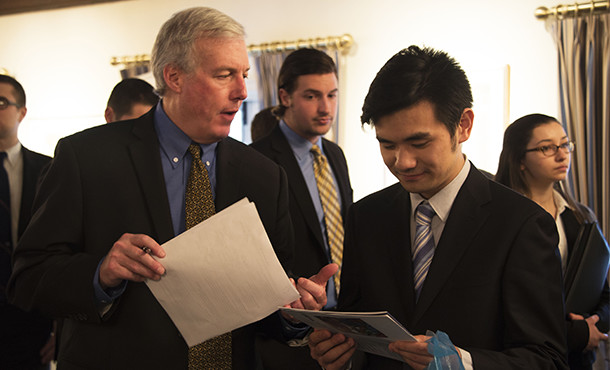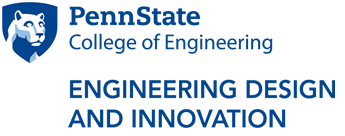
Recruiters are attracted to students who quickly and effectively demonstrate leadership characteristics and technical abilities during busy career fairs.
Study shows recruiters seek engineering students with leadership experience
01/17/17
UNIVERSITY PARK, Pa. — Many engineering students begin their quests for internships, co-ops, or full-time employment during the start of each new semester. To aid students in their venture, Penn State and its academic units hold career fairs throughout the fall and spring semesters. The 2017 College of Engineering spring recruiting event will take place on Wednesday, Jan. 25, from 1-6 p.m. at the Nittany Lion Inn.
Because of the number of students who attend, these events are busy, making it difficult for individual students to stand out. More than 2,200 students and 300 employers attended the 2015 Penn State Technical Full-Time Recruiting Day held at the Bryce Jordan Center, leaving students with less than one minute to convey their interests in and qualifications for jobs.
According to a study conducted by the National Association of Colleges and Employers, recruiters are attracted to students who quickly and effectively demonstrate leadership characteristics and technical abilities during busy career fairs.
Penn State’s Engineering Leadership Development (ELD) program decided to explore exactly what recruiters are looking for during career fairs regarding engineering leadership characteristics.
The ELD program offers an undergraduate minor; a one-year, non-thesis Master of Engineering in Engineering Leadership and Innovation Management; and an online graduate certificate in engineering leadership and innovation management. These offerings help students develop the knowledge and skills in engineering leadership that employers are seeking.
For the study, ELD faculty members interviewed career-fair recruiters to better understand the behaviors displayed by successful students in attendance. Faculty members believe the findings from this study may help students better prepare for career fairs offered at Penn State.
They found that employers wanted to hear about experiences with student organizations, internships and co-ops and engineering projects. However, simply listing a project title or involvement in a program is not enough. Employers want to know how these activities help students develop leadership.
“Students who reflect on their experiences in these activities and talk about how they learned how to effectively lead through them was a continuous theme from the recruiters. Students should include statements in their brief conversation with employers that highlights those skills,” said Meg Handley, associate director of engineering leadership outreach. “An example might be something like ‘During my internship, I led a team that troubleshot a problem with a plant machine. Through this leadership opportunity, I learned that by establishing team cohesiveness where everyone has a voice, and focusing on open communication, I could inspire the team to meet the goals of the project well in advance of the deadline.”
Faculty also discovered that students who demonstrated engineering leadership at career fairs established a connection with the company by understanding what the company had to offer and relating it to their career goals. Establishing this connection may indicate that a student shows an ability for big-picture thinking, a key leadership characteristic.
Finally, the study found that recruiters rank confidence as a key behavior that demonstrates leadership. According to recruiters, a confident student will look people in the eye, give a firm handshake, appear calm, and dress professionally. The delivery of a 30-second pitch to the recruiter must be cool, calm and collected. Recruiters stressed that students should practice pitches before career fairs in order to boost confidence.
The ELD program focuses on building key leadership characteristics throughout its curriculum. One classroom activity held every semester in ENGR 408 Leadership Principles, the entry course for the minor, is a mock career fair. This in-class activity gives students an opportunity to practice their pitches to real recruiters who give them feedback.
“As a former recruiter with both GE and Lockheed, this activity gives students an excellent opportunity to begin thinking and shaping their communication to recruiters based on an understanding of leadership,” Mike Erdman, Walter L. Robb Director of Engineering Leadership Development and instructor of engineering science, said.
Students enrolled in ELD offerings have opportunities to build knowledge and develop key leadership characteristics such as communication, collaboration and problem-solving, through leading technical project teams, working cross-culturally and virtually with partner institutions across the globe, and building self-awareness through assignments and reflections.
“It isn’t surprising that 15 percent of the recruiters we interviewed specifically noted the ELD program. Students who mentioned their involvement in the ELD program immediately caught their attention as highly qualified and prepared students,” Handley said.
She added that it is important to share the studies findings with all students, as there are many great programs within the College of Engineering that help to develop the non-technical competencies recruiters are seeking.
“Students who are able to craft a pitch that demonstrates what they have learned in their experiences, how it connects to the company, and do it with confidence are going to jump to the top of the list during the busy recruiting season,” she said.
For more information on the ELD program and its offerings, visit http://www.eld.psu.edu/.
MEDIA CONTACT:
Samantha Chavanic
smh5218@engr.psu.edu


